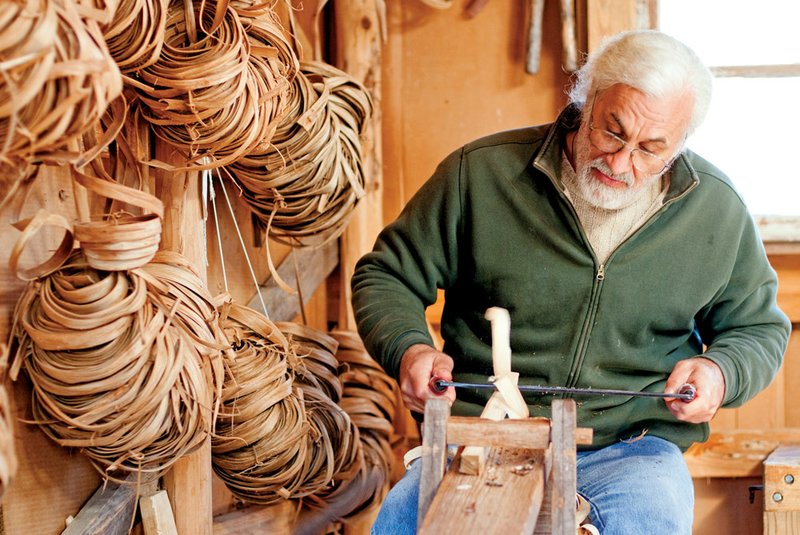After years of marketing his woodwork, Owen Rein now does most of his business from his own front porch. And it’s a tough front porch to find.
Tucked away a few miles from Arkansas 58, small, wooden signs guide visiting cars down the narrow, tree-lined path that leads to a small clearing that holds Rein’s house and workshop. The road is so tight you wonder what would happen if you met a passing car, but it’s unlikely that two cars will ever meet. It’s an isolated way of life, and Rein, who’s been living on the property since the ’90s, wouldn’t have it any other way.
“I really like where I’ve ended up,” Rein said. “I really love it. I think it’s a wonderful thing to live like this.”
The woods are what’s important to Rein. The forest on his property is full of hickory and oak, and it was those trees that helped Rein decide to build his home there. Rein fells the trees and splits the wood himself, using simple, old-fashioned tools that almost never need to be replaced.
“It’s an old-time way that lets one person work directly with their own trees,” Rein said.
Curls of wood spilled from the door of his small workshop and blanketed the nearby ground like a coat of dry leaves. Inside the workshop, there’s no power — just a few neatly organized tools, handmade drying shelves and a well-worn shaving horse. Drawknife in hand, Rein settles in with his just-split wood, and after a few smooth pulls and deft turns, a chair leg forms.
“I’m working the wood while it’s still green, and going with the grain,” Rein said. “The way I work, it hardly even needs any sanding.”
Rein specializes in dining-room chairs and rocking chairs, along with woven baskets and bowls. Although he didn’t first see his craft as a possible career, Rein has been woodworking for years.
“How I got started might be a little to do with sibling rivalry,” Rein said.
Born in Vietnam, Rein lived in Indonesia with his family when he was young, and his parents hired a local man to teach his brother woodworking.
“I was always asking, ‘Daddy, when do I get to take lessons?’” Rein said. Back in the states, lessons were harder to come by, but Rein never forgot that he’d wanted to learn.
“It got set in my brain at 7 years old,” Rein said.
His woodworking skills are mostly self-taught, and Rein describes his methods as fairly uncomplicated. It’s all about finding the right tree and keeping the knives sharp.
Moving through the woods near his house, Rein stares up to the top of a tree, feeling around the trunk. He looks for different characteristics depending on what he intends to make.
“This one here is nice and round and tall, wonderful for making chairs,” Rein said. “I can tell it will split well, it’s centered, and inside, I can tell the grain is going to be straight.”
Rein uses as much of a tree as he can when he cuts it down. When an ice storm in 2009 knocked trees down near his house, he used those instead of cutting new ones. His motto is “Do no harm,” and Rein works to make sure he takes just enough from his land to live off of and makes sure he gets the most value he can out of each tree.
“Usually when I cut a tree now, it’s for a specific order. I know exactly when it needs to be ready and how much I need,” Rein said.
Rein does most of his business in chairs. His rocking chairs go for around $1,200 each, and dining-room chairs for around $350 each.
He’ll ship his items, begrudgingly, to buyers outside the state, but most people drive to his property to pick up their orders.
Rein at one time worked making custom furniture for a large company but grew disillusioned with the way his bosses ran their business, cheapening the work to churn out more product.
“It’s not a good cycle to be in,” Rein said.
Rein instead set his sights on a more traditional, sustainable way of life. During the recession in the late ’70s, Rein found himself unable to keep up with his $60-a-month portion of the rent in a New York house.
“I was sick and at home and decided I needed a plan B,” Rein said. “I thought, ‘Why don’t I go off into the woods and build a house?’”
So, with little training, he did — out of hemlock logs.
“It changed our whole lives,” Rein said. “It didn’t even have any running water, but we realized that even with the little money we had from odd jobs, we had enough.”
Rein moved to Arkansas in 1980, and when he and his wife divorced, he purchased his land and took four months to build the three-bedroom log home he now lives in, complete with spring-fed water in the kitchen, solar panels on the roof and an outhouse down a short path.
“Building it myself, I learned a lot about what I liked and what I didn’t, what makes me happy,” Rein said.
A Netflix subscription makes the “like” list, though the Internet and cellphones do not.
Rein is the first to admit that he was never a good salesman, but after years in the business, his chairs sell themselves. Over the years, Rein has been commissioned to make rocking chairs for former U.S. Sen. David Pryor and former President Bill Clinton.
In 1994, Rein won the
Arkansas Arts Council Fellowship Award and has written numerous articles for woodworking magazines over the years. Repeat customers and friends of customers send in enough orders that Rein is nearly always working on a project.
“Everything I do in my work and life is real simple,” Rein said. “It’s a good place to be.”
Staff writer Emily Van Zandt can be reached at (501) 399-3688 or evanzandt@arkansasonline.com.
